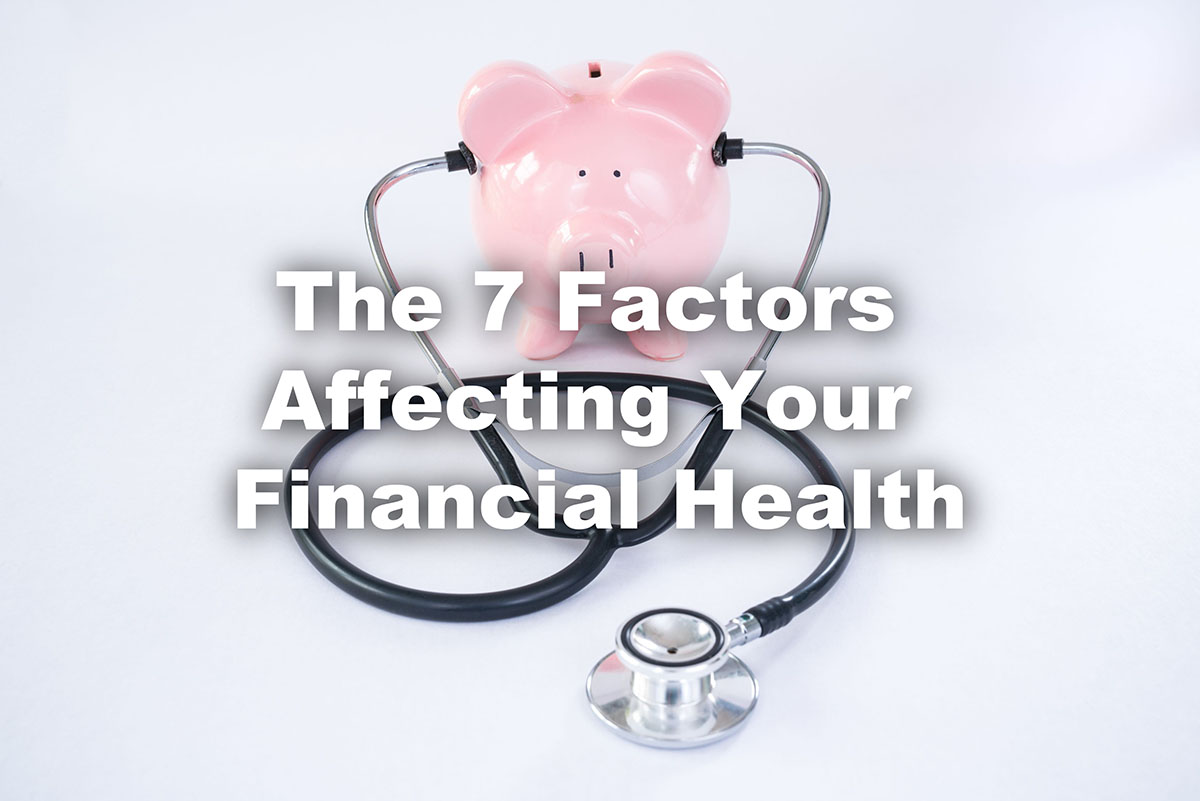
The 7 Factors Affecting Your Financial Health
What exactly is financial health and why is it important? Financial health measures the well-being of your finances. This considers more than just what you make and what you spend; there are actually many factors that play into your financial health. So, if you’ve been trying to measure the health of your finances, here are seven factors that are affecting your finances right now.
7 Factors To Help Your Financial Health

1. Your Income
If financial health were a body, income would be the heart. Without income, financial health doesn’t exist, so you need to have money coming in to get started. Financial health doesn’t just consider how much income you have, but also how consistent it is and how it racks up compared to what you owe.
If you make $2,000 per month, for example, but only owe $1,000 on a car you own, your financial health looks promising. If instead you make $4,000 a month but owe $20,000 on credit cards, you may need to do some serious fixing and adjustments to your finances. This may include getting a second job or selling some of your items to bring in more income.
2. Your Financial Consistency
Financial health also considers your spending and saving tendencies month after month. It’s not enough to just put money into your savings once a year and then spend any extra money the rest of the time – you need to be consistent in your financial behaviors and spending. This means creating a realistic budget and sticking to it. No matter how much you may put it off, it has to get done.
You may even find that you need to start tracking your spending. This can give you a clear picture of how you spend your money and what changes you need to make. This is also a great way to come up with a budget that works for your specific situation and is something you can actually stick to. You can start tracking your spending by yourself or with an app on your phone.
3. Your Return On Investments
Return on investment – or ROI – is how much you are making from an investment compared to how much you paid for that investment. To calculate it, divide the profit earned by the investment. Expectancies for a “good” ROI can be subjective. If you’re investing a lot of money, you may think this makes you financially healthy; however, if that investment is only bringing in a 1-3% ROI, you may be losing out.
4. Your Emergency Fund
Having an emergency fund is a lot like getting in shape. It’s likely to prolong your financial health and requires a bit of effort to start. Having an emergency fund is essential to prepare yourself for the worst in case it happens. We never know when an emergency will hit, so it is important we make sure we are as prepared as we possibly could be with our financial situation.
Experts say that your emergency fund should cover between three to six months’ worth of expenses and be held in an easily accessible bank account. They should also not be invested. Basically, you put it in your account and leave it alone. If money is tight, start small by saving just a few bucks a month. If you come into any extra money, immediately put it in this account.
5. Your Debt
It goes without saying that debt affects financial health immensely. Some debt could be considered “good,” such as a home mortgage, while others, like credit card debt, are bad for your finances. Many companies will look at your debt-to-income ratio to determine your financial health. Debt will also affect your credit score, which is another indicator of how you manage your finances.
6. Your Daily Habits
Financial health considers all of the numbers, but it also looks at your behavior. What do you do when you have money left over at the end of the month? Do you find ways to make more money if you have a big upcoming purchase? Your motivations, actions, and perspectives – or lack of them – are sure to affect your financial health throughout your lifetime. Better behavior means better health.
7. How You Face Financial Emergencies
If your car breaks down or you have an emergency medical bill, are you prepared to pay for them? Financial emergencies can make or break financial health – especially if you find no way out and lose track of your budget because of them. Luckily, those who need cash fast can look to New Mexico Title Loans, Inc. to get a car title loan in as quickly as half an hour.
If approved, you can have money in your hand by the end of the day to face your emergency while still taking care of your financial health. Title loans are for those who own their car outright, with no outstanding liens on the title. The loan amount depends on the condition of your car and can vary from $300 to $10,000.
To start the process, you’ll fill out a quick online form and wait for a call from one of our representatives. They will answer all of your questions and arrange to meet you at a location of your choosing or at the nearest title loan store location. They will assess your items and vehicle to determine if you qualify for approval. If you do, you’ll get the money on the same or the next day.

Work On Your Financial Health Now!
When you are working on your financial health, it is important to know these factors that affect it. And once you know these factors, you can do what you need to protect your finances. And if you run into a financial emergency, reach out to New Mexico Title Loans, Inc. for help. Our title loan may be the right option to help you out, so fill out the online form now to get started.
Note: The content provided in this article is only for informational purposes, and you should contact your financial advisor about your specific financial situation.
